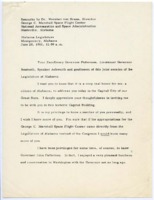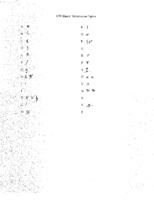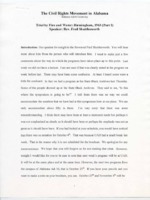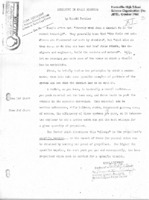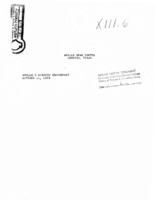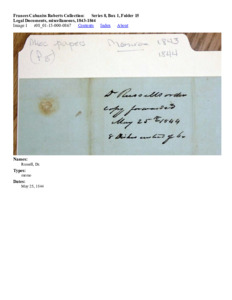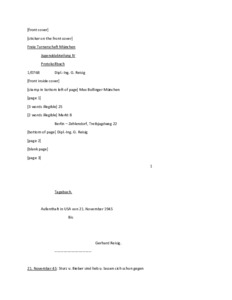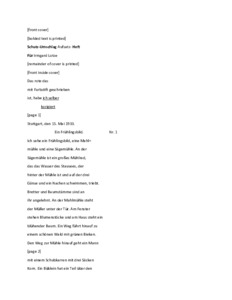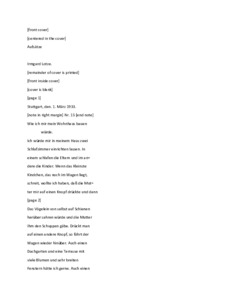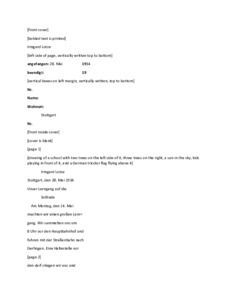
Browse Items (27 total)
Sort by:
-
Transcript of a speech given by Wernher von Braun to the Alabama Legislature.
Von Braun, then the director of Marshall Space Flight Center in Huntsville, Alabama, delivered this speech to the legislature in 1961. In the speech, he emphasizes that Alabama must take advantage of its position in the aerospace industry and create a robust "academic and research environment" in Huntsville to attract businesses that "will give birth to major new industries throughout the state." He exhorts the legislature to fund the newly established University of Alabama Research Institute (now part of the University of Alabama in Huntsville), arguing that "the Institute will not only be self-sustaining, but will enrich the State both financially and culturally." The legislature later approved von Braun's request of $3 million for the Research Institute, enabling the purchase of 200 acres of land for the campus and the construction of the Institute in 1964. The speech includes copies of slides von Braun used during his presentation, including diagrams of Saturn and Nova rockets as well as a mockup of a Saturn rocket on the lawn of the state capitol in Montgomery. -
Transcript of the Civil War diary of George Washington Harris.
Harris served as a private in Company F of the 149th Indiana Infantry Regiment, which occupied Decatur, Alabama in 1865. He enrolled at Terre Haute, Indiana, on February 15, 1865 at the age of twenty. Harris records his experiences as a soldier and traces his journey south to Decatur. Harris was discharged on September 27, 1865. The transcription includes a key to the cipher that Harris sometimes used, as well as notes and clarifications in brackets and parentheses. Also included are the complete lyrics to the Union song "Reply to the Bonnie Blue Flag," part of which Harris records in an entry here. -
Transcript of "Trial by Fire and Water: Birmingham, 1963" (Part I).
Rev. Fred Shuttlesworth is the speaker in this lecture given at Alabama A&M. -
"Chemistry in Space Boosters" presentation given at Huntsville High School.
The document is a draft of the presentation "Chemistry in Space" by Harold Perkins, who explains the role of chemists in developing space launch vehicles. The document Includes references to charts and other presentation supports. The document is marked in the upper left hand corner "Huntsville High School Science Organization (the JETS), October 1962." -
"Apollo 7 Mission Commentary."
This document contains the transcript from the Apollo 7 mission. This transcript contains the communication from the first seven days of the ten day mission. -
Transcript of 1945-1946 Journal of Gerhard Reisig Dipl.-Ing.
Gerhard Reisig Dipl.-Ing., later Dr. Gerhard Reisig, was a German-American rocket scientist that worked on the team of von Braun at Fort Bliss. This journal covers his journey to the United States under Operation Paperclip, and includes descriptions of his experience to and through his arrival on December 6th, 1946. In this journal, he discusses numerous parts of his travel and experience in the United States including the rail route taken by the group he was in, reviews of two films of the time, comments on fashion and American society, as well as periodic mentions of food culture especially early in the journal. The transcript includes links to copies of the articles he transcribed by hand if they could be found. -
Transcript of Irmgard Stuhlinger School Essays, No. 1 to No. 13
Irmgard Stuhlinger was the wife of Ernst Stuhlinger, a scientist acquired in Operation Paperclip. In these school essays, she discusses her daily life in Stuttgart, Germany, as a child. When writing these essays she was 8 years old. Some of the topics include a letter to family members, Christmas, descriptions of the weather, and talking about field trips. -
Transcript of Irmgard Stuhlinger School Essays, from No. 15
Irmgard Stuhlinger was the wife of Ernst Stuhlinger, a scientist acquired in Operation Paperclip. In these school essays, she discusses her daily life in Stuttgart, Germany, as a child. When writing these essays she was 8-9 years old. Some of the topics include letters to family members, a fictional story, Christmas, descriptions of the weather, and talking about field trips. -
Transcript of Irmgard Stuhlinger School Essays, 1934-1935
Irmgard Stuhlinger was the wife of Ernst Stuhlinger, a scientist acquired in Operation Paperclip. In these school essays, she discusses her daily life in Stuttgart, Germany, as a child. When writing these essays she was 9-10 years old. Topics of the essays include family life, a fictional moral story, descriptions of the weather, as well as significant historic events such as the Saarabstimmung (1935 Saar status referendum). Furthermore, she mentions Adolf Hitler (German chancellor) and the Sturmabteilung (Paramilitary organization run by Nazi Germany) in these essays. The transcript includes a description of each illustration.
